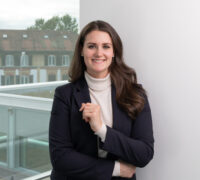
Digital sustainability: it pays to be a leader, not a laggard
Companies that excel in both digital and sustainable transformation attract a stock market premium, according to research. So, how do you tap into that value? ...

by Cyril Flaig, Leo Legler, Deborah Walt
Published 6 September 2023 in Competitiveness • 6 min read
Among the many things highlighted by the COVID-19 pandemic was the conflict between short-term and long-term. Closing schools may have curbed the spread of the virus initially, but the lasting consequences of missed education on social inequality and the mental health of young people could end up being worse.
With society confronting extreme risks from pandemics to climate change, and the rise of Artificial Intelligence we need to take greater care that decisions taken now won’t compromise the ability of future generations to meet their needs.
One solution, we believe, is fostering greater cross-generational dialogue. The St. Gallen Symposium was founded in 1969 to help bridge the divide between generations and enable the “Leaders of Tomorrow” to debate with the senior leaders of today on an equal footing.
In 2022, the Symposium launched a joint initiative with the Club of Rome: A New Generational Contract. Guided by seven key principles, the aim is to identify actionable priorities and launch impactful projects that foster long-term thinking and system transformations, by enabling mutual learning and collaboration across generations.
Some countries have already taken steps to foster more long-term thinking across society.
One of the speakers at this year’s Symposium was Sophie Howe, who was appointed as the first Future Generations Commissioner for Wales in 2016 to encourage public bodies to consider the long-term consequences of their decisions.
Howe’s appointment was tied to the passing of the Wellbeing of the Future Generations Act by Wales in 2015, which sets out long-term goals – such as addressing socioeconomic disadvantage or ecological resilience.
To reap the benefits of cross-generational teams, both younger and older workers must be open, and willing, to receive feedback from each other.
During her tenure, Howe acted as the guardian for future generations, speaking out, for example, against an expensive road-building scheme. Howe questioned how the project aligned with the goal of a more equal Wales when a quarter of the poorest families in the country didn’t even own a car. Her intervention not only led to the cancellation of the project but a complete rethink of Wales’s infrastructure policy.
In Switzerland, the Symposium has also initiated an exchange with the city/cantonal government of St Gallen to make sure that the perspectives of young people are integrated into policies. In a first step, the State Secretariat will ensure that a format for a sounding board with the next generation is established in the upcoming 2024 priority planning.
The push to embrace this kind of thinking shouldn’t just be limited to politics. Business leaders can also boost their long-term outlooks, by involving the unique competencies of younger experts.
One of the projects to emerge from the New Generational Contract is Young Leaders on Boards, which works with forward-looking businesses to include the unique competencies and perspectives of the next generation in their boards.

In many businesses, a strict hierarchy still prevails. While experience counts for a lot, it’s important to acknowledge that younger people, especially those who are digital natives, may have more expertise in certain areas such as digitalization and sustainability.
To reap the benefits of cross-generational teams, both younger and older workers must be open, and willing, to receive feedback from each other. Many younger people may be reluctant to share their opinions openly with their managers, but they shouldn’t be afraid of making their voices heard, especially on matters where they can bring a fresh perspective. After all, the world started listening to Greta Thunberg when she was just a Swedish schoolgirl sitting in front of parliament to protest the lack of action on climate change.
At the same time, younger people should recognize that the older generations also have wisdom they can share because of their different life experiences. Cross-generational dialogue shouldn’t be a one-way street but should be about constant reflection and communication.
It’s very easy to get consumed by the franticness of our day-to-day lives. There’s always someone who needs the answer to a question or a problem that needs solving urgently. To make sure that we devote enough time to think about the long-term, it’s important to block the time in our calendars to reflect on the long-term vision for the future.
One of the seven guiding principles in the New Generational Contract is Hindsight and Foresight: looking back to see ahead. We believe that this is a skill that everyone should cultivate: to understand and build on experiences and insights from the past and look forward by gauging the consequences, both positive and negative, of our actions on the future. This requires thinking, deciding, and acting on multiple timescales and identifying the dilemmas and synergies that may arise from the short-term and long-term.
We are heartened by signs that business and politics are increasingly bringing younger people into the decision-making process. Organizations have launched reverse mentoring programs, and companies are starting to express an interest in having more age diversity on boards. We hope this is not a fad but that leaders of today continue to listen to the voices of future generations.
These three leaders inspired us with their future-orientated perspectives.

Head of the International Students’ Committee at St. Gallen Symposium 2022/2023.
Cyril Flaig is a bachelor’s student in Economics at the University of St. Gallen. He was part of the International Students’ Committee organising the St. Gallen Symposium for two years.

Head of the International Students’ Committee at St. Gallen Symposium 2022/2023
Leo Legler is a bachelor student in Business Administration at the University of St. Gallen (HSG). He is part of the leadership team of the St. Gallen Symposium in 2022/2023. Besides, he is interested in technology and entrepreneurship.

Head of the International Students' Committee at St. Gallen Symposium 2022/2023
Deborah Walt is a master’s student in Law & Economics at the University of St. Gallen. She has been a part of the International Students’ Committee organising the St. Gallen Symposium for two years and will be leading the ISC for another year.

17 July 2024 • by Michael R. Wade, Evangelos Syrigos in Competitiveness
Companies that excel in both digital and sustainable transformation attract a stock market premium, according to research. So, how do you tap into that value? ...

8 July 2024 • by Richard Baldwin in Competitiveness
As the world’s largest democracy prepares to overtake China in terms of economic growth, it offers a huge investment opportunity, explains IMD’s Richard Baldwin....

26 June 2024 • by Arturo Bris in Competitiveness
Don’t be deterred by doom-laden narratives. To create societies that are prosperous and inclusive, it’s time for leaders to focus on facts and future readiness, says Arturo Bris...

14 June 2024 • by Howard H. Yu in Competitiveness
This weekend’s G7 summit will see renewed calls for protectionist measures against Chinese EV manufacturers. But tariffs would be misguided and universally damaging, warns IMD’s Howard Yu ...
Explore first person business intelligence from top minds curated for a global executive audience